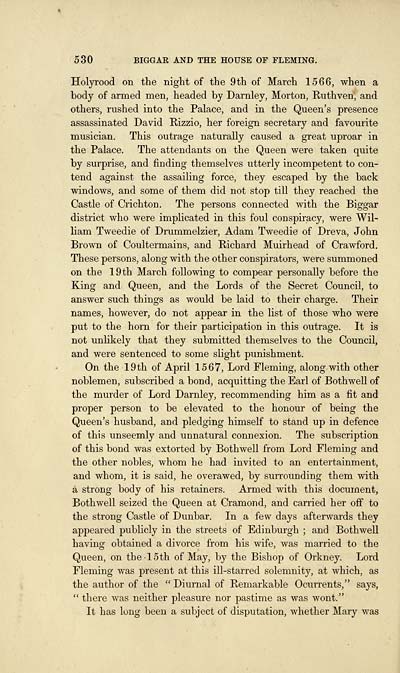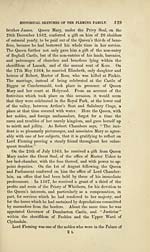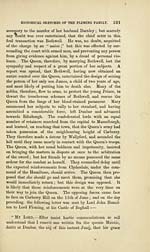Biggar and the House of Fleming
(560) Page 542
Download files
Complete book:
Individual page:
Thumbnail gallery: Grid view | List view

530 BIGGAR AND THE HOUSE OF FLEMING.
Holyrood on the night of the 9th of March 1566, when a
body of armed men, headed by Darnley, Morton, Ruthven, and
others, rushed into the Palace, and in the Queen's presence
assassinated David Rizzio, her foreign secretary and favourite
musician. This outrage naturally caused a great uproar in
the Palace. The attendants on the Queen were taken quite
by surprise, and finding themselves utterly incompetent to con-
tend against the assailing force, they escaped by the back
windows, and some of them did not stop till they reached the
Castle of Crichton. The persons connected with the Biggar
district who were implicated in this foul conspiracy, were Wil-
liam Tweedie of Drummelzier, Adam Tweedie of Dreva, John
Brown of Coultermains, and Richard Muirhead of Crawford.
These persons, along with the other conspirators, were summoned
on the 19th March following to compear personally before the
King and Queen, and the Lords of the Secret Council, to
answer such things as would be laid to their charge. Their
names, however, do not appear in the list of those who were
put to the horn for their participation in this outrage. It is
not unlikely that they submitted themselves to the Council,
and were sentenced to some slight punishment.
On the 19th of April 1567, Lord Fleming, along with other
noblemen, subscribed a bond, acquitting the Earl of Bothwell of
the murder of Lord Darnley, recommending him as a fit and
proper person to be elevated to the honour of being the
Queen's husband, and pledging himself to stand up in defence
of this unseemly and unnatural connexion. The subscription
of this bond was extorted by Bothwell from Lord Fleming and
the other nobles, whom he had invited to an entertainment,
and whom, it is said, he overawed, by surrounding them with
a strong body of his retainers. Armed with this document,
Bothwell seized the Queen at Cramond, and carried her off to
the strong Castle of Dunbar. In a few days afterwards they
appeared publicly in the streets of Edinburgh ; and Bothwell
having obtained a divorce from his wife, was married to the
Queen, on the 15th of May, by the Bishop of Orkney. Lord
Fleming was present at this ill-starred solemnity, at which, as
the author of the " Diurnal of Remarkable Ocurrents," says,
" there was neither pleasure nor pastime as was wont."
It has long been a subject of disputation, whether Mary was
Holyrood on the night of the 9th of March 1566, when a
body of armed men, headed by Darnley, Morton, Ruthven, and
others, rushed into the Palace, and in the Queen's presence
assassinated David Rizzio, her foreign secretary and favourite
musician. This outrage naturally caused a great uproar in
the Palace. The attendants on the Queen were taken quite
by surprise, and finding themselves utterly incompetent to con-
tend against the assailing force, they escaped by the back
windows, and some of them did not stop till they reached the
Castle of Crichton. The persons connected with the Biggar
district who were implicated in this foul conspiracy, were Wil-
liam Tweedie of Drummelzier, Adam Tweedie of Dreva, John
Brown of Coultermains, and Richard Muirhead of Crawford.
These persons, along with the other conspirators, were summoned
on the 19th March following to compear personally before the
King and Queen, and the Lords of the Secret Council, to
answer such things as would be laid to their charge. Their
names, however, do not appear in the list of those who were
put to the horn for their participation in this outrage. It is
not unlikely that they submitted themselves to the Council,
and were sentenced to some slight punishment.
On the 19th of April 1567, Lord Fleming, along with other
noblemen, subscribed a bond, acquitting the Earl of Bothwell of
the murder of Lord Darnley, recommending him as a fit and
proper person to be elevated to the honour of being the
Queen's husband, and pledging himself to stand up in defence
of this unseemly and unnatural connexion. The subscription
of this bond was extorted by Bothwell from Lord Fleming and
the other nobles, whom he had invited to an entertainment,
and whom, it is said, he overawed, by surrounding them with
a strong body of his retainers. Armed with this document,
Bothwell seized the Queen at Cramond, and carried her off to
the strong Castle of Dunbar. In a few days afterwards they
appeared publicly in the streets of Edinburgh ; and Bothwell
having obtained a divorce from his wife, was married to the
Queen, on the 15th of May, by the Bishop of Orkney. Lord
Fleming was present at this ill-starred solemnity, at which, as
the author of the " Diurnal of Remarkable Ocurrents," says,
" there was neither pleasure nor pastime as was wont."
It has long been a subject of disputation, whether Mary was
Set display mode to:
![]() Universal Viewer |
Universal Viewer | ![]() Mirador |
Large image | Transcription
Mirador |
Large image | Transcription
Images and transcriptions on this page, including medium image downloads, may be used under the Creative Commons Attribution 4.0 International Licence unless otherwise stated. ![]()
| Histories of Scottish families > Biggar and the House of Fleming > (560) Page 542 |
|---|
| Permanent URL | https://digital.nls.uk/94846002 |
|---|
| Description | A selection of almost 400 printed items relating to the history of Scottish families, mostly dating from the 19th and early 20th centuries. Includes memoirs, genealogies and clan histories, with a few produced by emigrant families. The earliest family history goes back to AD 916. |
|---|

